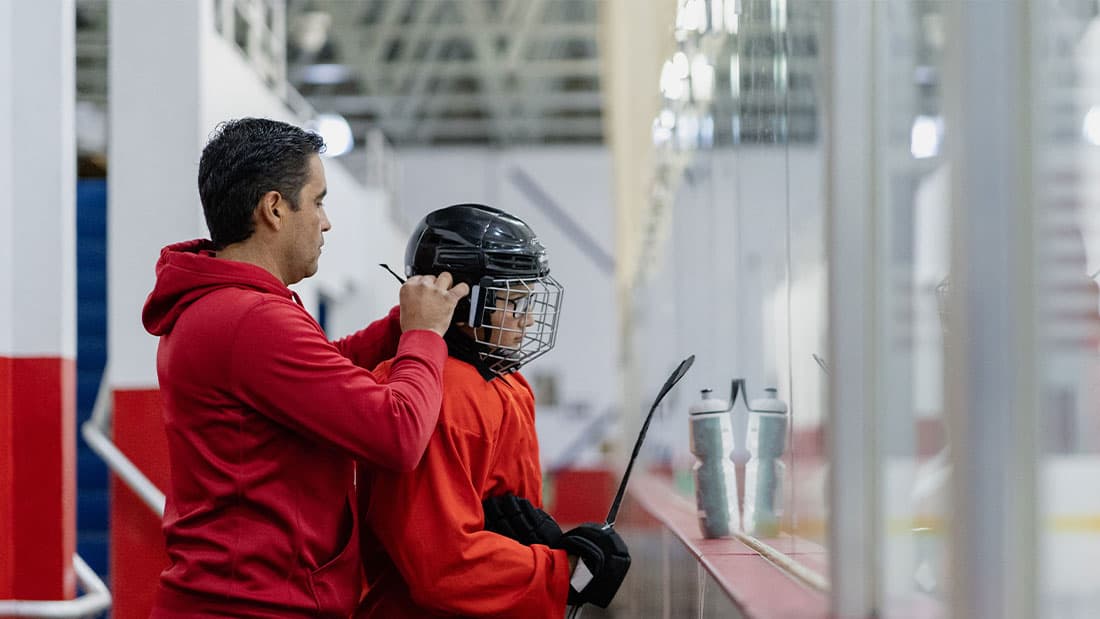Youth Soccer Coaching 101
Jumping into coaching for the first time can be intimidating, especially for youth athletics. It can seem impossible to keep up once you throw in a sport that involves a complex rulebook and numerous cues. However, getting started is easier than you think, and here are three focal points that can help you not just begin your career as a coach, but help your young athletes grow!

Youth Soccer Coaching Tips
Exemplary Communication
Exemplary communication should be a top priority, pertaining to your athletes and their respective parents.
Whether during practices or games, getting across to your athletes is a core staple to maintain when you are a coach. Using clear and concise language and being able to relay your thoughts with direct intention is important for youth coaches to maintain a strong leadership presence on the pitch. However, it is just as paramount, if not more, for coaches to maintain a high-level method of active listening.
For a coach to be a good listener, they must be diligent of different messages, signals, and even mannerisms that their athletes may be sending off on. It can be very easy for coaches to anticipate different responses and therefore be quick to ready responses for a set occasion. However, being able to slow down, hear their athletes relay their emotions, and then be empathetic to their set circumstances is important for coaches to garner trust from their athletes. Upon being an active listener and garnering the views of their athletes, coaches can then provide the open communication that athletes crave from their seen superiors.
While the overall context may then be different when coaches communicate with the parents of the athletes, many of the same attributes for clear communication and active listening remain the same. Coaches can relay their goals and expectations for the athletes when communicating with the parents, and then take a part in being an active listener when the parents relay what they wish for from their children participating in the team environment. Crucially, coaches can then involve the parents in discipline protocols and setting standards for the team, which can further link the communication chain of coaches, athletes, and parents.
Keep It Simple
When coaching, keep the language of the game simple, and work to let the athletes focus on playing autonomously.
There’s no denying a very simple truth; the game of soccer is full of rules and guidelines that can be difficult to relay in their entirety. When first starting, it’s important for coaches to make a solid, well-thought-out list of what rules and guidelines they find paramount to relay to their youth athletes. What’s labeled as an offside pass, an illegal tackle, throwing in passes from out-of-bounds; are just a few of the rules that youth coaches must be aware of to teach their young athletes. During practices and scrimmages, coaches should use clear communication to allow athletes to understand what not to do in fouls and rules, teach the foundations of active and proper sportsmanship, and even encourage their athletes to be leaders amongst themselves.
Ultimately, what can trip up a first-time coach when trying to coach their youth athletes is when the language becomes too technical and too advanced, too quickly. Coaches will want nothing more than to see their athletes succeed and play hard through every minute of practice and games. However, being too focused on crafting ‘expert’ formations and strategizing complicated plays may not be the most suitable to the young mind still learning the game’s ins and outs. Relaying the basic foundations and principles for each position will be an easier task for coaches to exhibit, giving them more time to coach the team collectively and each player individually.
About in-game decisions, a youth soccer coach can also benefit from giving their team the ability to act autonomously, giving them some freedom to make in-game decisions. Once a coach tries to do too much, they start to draw away from an important lesson a good coach tries to teach their young athletes; don’t just strive to be a better player, strive to be a better leader and act together. Stepping back at critical moments and allowing their athletes to showcase the hard work they’ve put in can further develop the athletes’ individual skillsets and ability to work as a collective unit. This can ease the load on the coach, giving them the opportunity to be the motivator for their athletes and coach when required.
Make It Fun
Exhibit you’re having fun putting in the work, and your athletes will follow suit. While it may continue to come off as a cliche and a cardinal rule for first-time coaches to remember, it is especially true for coaches of youth athletes to show that not only do they care about the work they’re putting in; they need to show that they are enjoying the time with their athletes. It is important to establish everlasting memories for youth athletes from the get-go, whether it’s a player’s first year playing the game of soccer, or they’ve played for several years. When a coach simply smiles and exhibits mannerisms that showcase their love for their profession, youth athletes have a higher probability to care more for the game and try and play harder for the team and their coach.
Introducing team-building activities, being attentive to player needs, or even as simple as high-fiving their athletes for doing a drill correctly for the first time; a first-time coach should be proactive in building those positive bonds from the get-go. Getting the athletes on board with a positive attitude and strong work ethic will be easier than being nonchalant and distant with one’s coaching. This is not to say that displaying a positive attitude and enjoyment of your work will be enough to be a great youth coach; hard work and dedication must be exhibited every day to not just be successful, but to improve. Coaching youth athletes can be a fulfilling opportunity and achievement, and maintaining these three tactics listed can be crucial for making the start-up an easy transition.
RECOMMENDED FOR YOU
MOST POPULAR
Youth Soccer Coaching 101
Jumping into coaching for the first time can be intimidating, especially for youth athletics. It can seem impossible to keep up once you throw in a sport that involves a complex rulebook and numerous cues. However, getting started is easier than you think, and here are three focal points that can help you not just begin your career as a coach, but help your young athletes grow!

Youth Soccer Coaching Tips
Exemplary Communication
Exemplary communication should be a top priority, pertaining to your athletes and their respective parents.
Whether during practices or games, getting across to your athletes is a core staple to maintain when you are a coach. Using clear and concise language and being able to relay your thoughts with direct intention is important for youth coaches to maintain a strong leadership presence on the pitch. However, it is just as paramount, if not more, for coaches to maintain a high-level method of active listening.
For a coach to be a good listener, they must be diligent of different messages, signals, and even mannerisms that their athletes may be sending off on. It can be very easy for coaches to anticipate different responses and therefore be quick to ready responses for a set occasion. However, being able to slow down, hear their athletes relay their emotions, and then be empathetic to their set circumstances is important for coaches to garner trust from their athletes. Upon being an active listener and garnering the views of their athletes, coaches can then provide the open communication that athletes crave from their seen superiors.
While the overall context may then be different when coaches communicate with the parents of the athletes, many of the same attributes for clear communication and active listening remain the same. Coaches can relay their goals and expectations for the athletes when communicating with the parents, and then take a part in being an active listener when the parents relay what they wish for from their children participating in the team environment. Crucially, coaches can then involve the parents in discipline protocols and setting standards for the team, which can further link the communication chain of coaches, athletes, and parents.
Keep It Simple
When coaching, keep the language of the game simple, and work to let the athletes focus on playing autonomously.
There’s no denying a very simple truth; the game of soccer is full of rules and guidelines that can be difficult to relay in their entirety. When first starting, it’s important for coaches to make a solid, well-thought-out list of what rules and guidelines they find paramount to relay to their youth athletes. What’s labeled as an offside pass, an illegal tackle, throwing in passes from out-of-bounds; are just a few of the rules that youth coaches must be aware of to teach their young athletes. During practices and scrimmages, coaches should use clear communication to allow athletes to understand what not to do in fouls and rules, teach the foundations of active and proper sportsmanship, and even encourage their athletes to be leaders amongst themselves.
Ultimately, what can trip up a first-time coach when trying to coach their youth athletes is when the language becomes too technical and too advanced, too quickly. Coaches will want nothing more than to see their athletes succeed and play hard through every minute of practice and games. However, being too focused on crafting ‘expert’ formations and strategizing complicated plays may not be the most suitable to the young mind still learning the game’s ins and outs. Relaying the basic foundations and principles for each position will be an easier task for coaches to exhibit, giving them more time to coach the team collectively and each player individually.
About in-game decisions, a youth soccer coach can also benefit from giving their team the ability to act autonomously, giving them some freedom to make in-game decisions. Once a coach tries to do too much, they start to draw away from an important lesson a good coach tries to teach their young athletes; don’t just strive to be a better player, strive to be a better leader and act together. Stepping back at critical moments and allowing their athletes to showcase the hard work they’ve put in can further develop the athletes’ individual skillsets and ability to work as a collective unit. This can ease the load on the coach, giving them the opportunity to be the motivator for their athletes and coach when required.
Make It Fun
Exhibit you’re having fun putting in the work, and your athletes will follow suit. While it may continue to come off as a cliche and a cardinal rule for first-time coaches to remember, it is especially true for coaches of youth athletes to show that not only do they care about the work they’re putting in; they need to show that they are enjoying the time with their athletes. It is important to establish everlasting memories for youth athletes from the get-go, whether it’s a player’s first year playing the game of soccer, or they’ve played for several years. When a coach simply smiles and exhibits mannerisms that showcase their love for their profession, youth athletes have a higher probability to care more for the game and try and play harder for the team and their coach.
Introducing team-building activities, being attentive to player needs, or even as simple as high-fiving their athletes for doing a drill correctly for the first time; a first-time coach should be proactive in building those positive bonds from the get-go. Getting the athletes on board with a positive attitude and strong work ethic will be easier than being nonchalant and distant with one’s coaching. This is not to say that displaying a positive attitude and enjoyment of your work will be enough to be a great youth coach; hard work and dedication must be exhibited every day to not just be successful, but to improve. Coaching youth athletes can be a fulfilling opportunity and achievement, and maintaining these three tactics listed can be crucial for making the start-up an easy transition.










